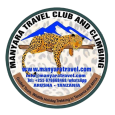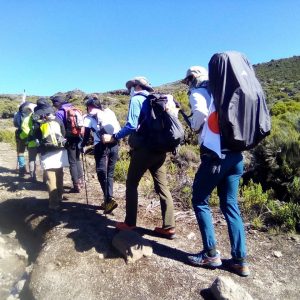7 Days Lemosho Route
Lemosho Route is an unspoilt, remote, little used and beautiful way up to the Shira Plateau. It can either be used to gain the Western Breach route or followed by the Kibo South Circuit to ascend by the easier Barafu Route. The route is one of the few where groups may be accompanied on the first day by an armed ranger, as the forests around the Lemosho Glades are rich in buffalo, elephant and other big game animals.
Each night we will overnight in mountain dome tents enjoying the meals prepared by our mountain camp chefs. Your guide will be the local Tanzanian guides the expertise and best knowledge of the mountain, explain fascinating details about the route, Flora and Fauna, and attend to the endless details that make a climb successful and look out for your safety
Day 01: Transfer to Town of Arusha
Pick up from Kilimanjaro International Airport/Bus station and transfer by shuttle bus to Arusha or Moshi drop of at Hotel your will enjoy stupendous view of Mount Kilimanjaro (Bed & Breakfast).
Day 02: Londorossi Gate (2100m) to Mti Mkubwa camp (2750m), 3hrs- Montane forest Your day starts early with a briefing, followed by breakfast and a 2-hour drive from Moshi (910m) to Londorossi Park Gate (2100m). The guides and porters prepare and pack the supplies and your equipment in the village. You will receive a lunch pack and you can also buy mineral water in the village. From here a forest track requiring a 4WD vehicle leads to Lemosho Glades (2100m, 11km, 45 minutes). You will have a lunch stop about half way and will reach the Machame camping area in the late afternoon. Walk along forest trails to Mti Mkubwa (big tree) campsite, (2750m, 3 hours). Your porters (arriving at the camp site long before you) will have your tent set up on your arrival. In the evening the porters will boil drinking and washing water and the cook will prepare dinner, before you retire to your tent for the night. Night temperatures can already drop to freezing point at this campsite.
Day 03: Mti Mkubwa camp (2750m) to Shira 2 camp (3840m), 6-5hrs- Moorlands
You rise early at Mti Mkubwa camp and, after breakfast, you climb an hour or so to the top of the forest and then the trail gradually steepens and enters the giant heather moorland zone. Several streams are crossed. A gentle walk across the plateau leads to Shira 2-camp on moorland meadows next to a stream (3840m). By now you will be able to see, in an easterly direction, the Western Breach with its stunning glaciers. The porters will boil drinking and washing water, before serving dinner. The night at this exposed camp will even be colder than the previous night, with temperatures dropping to well below freezing. Enjoy dinner and overnight.
Day 04: Shira (3840m) to Lava Tower (4630m) /Barranco camp (3950m), 7hrs/15km- Semi desert
The route now turns east into a semi desert and rocky landscape surrounding Lava Tower, where you reach an altitude of 4630m after about a 5 hours walk. Lunch is served in a designated area before ascending the rocky scree path to Lava Tower (4630m). This is definitely the toughest day so far. It is normally around this point, where for the first time, some climbers will start to feel symptoms of breathlessness, irritability and headaches. After lunch you descent again by almost 680m to the Barranco camping area and after reaching the high altitude of 4600m at Lava Tower, the true acclimatisation benefit of this day becomes clear. This descent to Barranco camp takes about 2 hours and offers great opportunities to take some beautiful photographs of the Western Breach and Breach Wall. The camp is situated in a valley below the Breach and Great Barranco Wall, which should provide you with a memorable sunset while you wait for your dinner.
Day 05: Barranco camp (3950m) to Barafu camp (4550m), 7hrs/13km- Alpine desert
After spending a night at the Great Barranco Wall (a very imposing sight at first), you make your way up this awesome looking obstacle, which in the end normally turns out to be easier than anticipated. Topping out just below the Heim Glacier, you now appreciate just how beautiful Kilimanjaro really is. The route then heads down through the Karanga Valley over intervening ridges and valleys, and then joins up with the Mweka route. This is the preferred route down from the summit, so remember it. Turn left up the ridge and after another hour or so, you reach Barafu Hut. The last water stop on the route is the Karranga Valley, as there is no water at Barafu camp. Barafu is the Swahili word for “ice” and it is a bleak and inhospitable camping area to spend the night. Totally exposed to the ever-present gales the tents are pitched on a narrow, stony, and dangerous ridge. Make sure that you familiarize yourself with the terrain before dark to avoid any accidents. The summit is now a further 1345m up and you will make the final ascent the same night. Prepare your equipment, ski stick and thermal clothing for your summit attempt. This should include the replacement of your headlamp and camera batteries and make sure you have a spare set available as well. To prevent freezing it will be wise to carry your water in a thermal flask. Go to bed at round about 19h00 and try to get some precious rest and sleep.
Day 06: Barafu camp (4550m)/Uhuru Peak (5895m)/Mweka (3100m), 8hrs to reach Uhuru Peak, 7 – 8hrs to descend to Mweka/7 km up. 23 km downt- Stone scree and ice-capped summit
You will rise around 23h30, and after some tea and biscuits you shuffle off into the night. You will head in a north-westerly direction and ascend through heavy scree towards Stella Point on the crater rim. For many climbers the 6-hour walk to Stella point is mentally and physically the most challenging on the route. At Stella Point (5685m) you will stop for a short rest and will be rewarded with the most magnificent sunrise you are ever likely to see (weather permitting). From Stella Point you will normally encounter snow all the way on your 2-hour ascent to Uhuru Peak. The time you will spend on the summit will depend on the weather conditions. Do not stop here for too long, as it will be extremely difficult to start again due to cold and fatigue. Enjoy your accomplishment and a day to remember for the rest of your live. The walk back to Barafu from the summit, takes about 3 hours. Here you will have a well earned but short rest and collect the rest of your gear, before heading down to Mweka hut (3100m). The route is not difficult and will take you down the rock and scree path into the moorland and eventually into the forest. The camp is situated in the upper forest and mist or rain can be expected in the late afternoon. Dinner and washing water will be prepared as well as drinking water.
Day 07: Mweka camp (3100m) to Mweka Gate (1980m), 3hrs/15km- Montane forest
After an early and well-deserved breakfast, it is a short 3-hour and scenic hike back to the Park gate. It is strongly recommended not to pay your porters any tips until you and all your gear have reached the gate safely. At Mweka gate you sign your name and details in a register. This is also where successful climbers receive their summit certificates. Those climbers who reached Stella Point (5685m) are issued with green certificates and those who reached Uhuru Peak (5895m) receive gold certificates. From the Mweka Gate you will continue down into the Mweka village, normally a muddy 3 km (1 hour) hike. In the Mweka village you will be served a delicious hot lunch!! You now drive back to Arusha for a long overdue hot shower, dinner and celebrations!!
Price per person for the Whole Trips Minimum 1 people to Maximum group 40 people.
Our Package include:
Fair and ethical treatment of porters.
All Park entrance fee.
Rescue fees in mountain
Transfers from Airport and return.
All meals while on the Mountain
Salaries to the guides, cooks and porters
Highly experienced English speaking – Professional & experienced mountain guides
Government Tax.
Hot water for washing every day
Clean, purified drinking water
Management and safety procedures
Fair and ethical treatment of porters
Water proof Tents Tent on climbing , Mess Tent and crew Tents
Guides, Porters, cook salaries and park fees
Large portions of fresh, healthy, nutritious food
Arrival and Departure transfers
Not include
Tips for guides,cook and porters
ALTOX Personal oxygen System
Tanzania Visa on arrival
Personal Expenses (e.g. laundry, telephone, beverages, etc.)
Optional Tours (short safari after your climb etc)
The Price does not include:
Gloves, Sun glasses, Sleeping bag, Hatclimbin suits, Warm Jacket,
Heavy boots, Scarf’s, Rain Trousers.
Note: All the above items can be hired at a reasonable price
Established in 2016 and fully registered with the Tanzania BRELA No: 137759659
Climb And Trek
Talk To Us
- +255 676 668 468
- +255742806279
- info@manyaratravel.com
- manyaratravelclub7@gmail.com
- Arusha, Tanzania, East Africa
Copyright © 2024 Manyara Travel Club and Climbing

